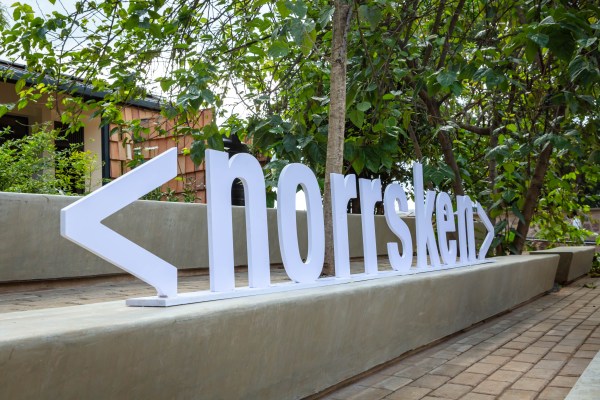In 2019, Swedish coworking space and investment fund Norrsken Foundation announced the launch of its first entrepreneurship hub outside the Scandinavian nation in Rwanda.
The center, located in Kigali, has finally opened up to the region, though it is happening in two phases. The first, which took place yesterday, will welcome 250 entrepreneurs. The second phase hopes to bring in over 750 additional entrepreneurs to the Norrsken House in Kigali by December 2022, the company confirmed to TechCrunch.
“We have massive demand we can satisfy to become the biggest physical hub for startups in Africa,” said the managing director of Norrsken East Africa, Pascal Murasira. “We believe Kigali is on a path to become one of Africa’s leading clusters for tech and startups, and we want to help accelerate that journey.”
The Kigali center is the first of 25 hubs the Norrsken Foundation plans to open globally over the next decade, according to founder Niklas Adalberth, the Klarna co-founder who left the unicorn fintech in 2016.
The foundation sees itself as “nonprofit, nonpolitical and nonpartisan” with a mission to help entrepreneurs solve the “world’s greatest challenges.”
In addition to its coworking space in Stockholm, Norrsken runs an impact accelerator program and an impact VC fund of €130 million.
In Africa, alongside Norrsken House in Kigali, the foundation also manages an Africa-focused seed fund. While Norrsken mentioned in 2019 that its seed investments ranged from $25,000 to $100,000, with plans to make later-stage investments from $100,000 to $1 million, it did not give any update on its fund size this time.
The organization only stated that it made a handful of investments into companies based in Rwanda, the two most recent ones being Viebeg Technology and PesaChoice.
While the pandemic played a huge role in the project delays, Norrsken said it continues to follow the timeline it laid out when starting in 2019.
“We think about launching Norrsken House just in the same way as we think about launching a product. You get it out there before it’s ready, to involve users and get feedback on how to perfect it,” a company’s spokesperson said. “We don’t have all the answers, and we need our users to help us shape the final product. Construction will continue and operations will gradually come online throughout the first half of 2022.”
But with the pandemic triggering shifts in how we work and communicate globally from offline to remote, why is Norrsken continuing with the project? To Adalberth, it all boils down to a known fact that offline clusters help create billion-dollar companies.
Globally, unicorns have popped up from cluster cities with economic, technological, innovative and real estate advancement: Think Silicon Valley, London, Stockholm, Beijing, Bengaluru, São Paulo and Lagos.
The founder hopes to replicate this model within the Norrsken House in Stockholm and Kigali. He believes Norrsken can create microcosms of these ecosystems with the center. And by bringing together 1,000 entrepreneurs solving real societal issues with their business models and connecting them to funding, network and mentorship, Norrsken aspires to create “impact unicorns.”
However, unlike Stockholm, which is regarded as a unicorn factory in Europe, Kigali doesn’t have a prominent big-name startup yet. And though it has a vibrant startup and tech ecosystem, it lags behind other markets such as Lagos, Nairobi, Cairo, Cape Town and Johannesburg in terms of receiving VC funding.
Still, Norrsken chose Kigali as its first base in Africa because of Rwanda’s advantage in providing a friendlier business environment, internet penetration and infrastructure.
“I think that we ended up with Kigali for a couple of different reasons. One is that we thought that we could perhaps make the highest impact in Kigali,” Adalberth said. “Also, from the World Bank, you know that Kigali is one of the easiest countries to do business in Africa. And it has built out infrastructure in terms of internet, traffic, and so on. So it’s a good prerequisite to building unicorns, and the final piece that was missing is what we’re trying to enable now with the Norrsken House.”
[gallery type="slideshow" size="medium" ids="2242615,2242609,2242614,2242618,2242619,2242616,2242612,2242613,2242610"]
According to Murasira, startups including PesaChoice, SPENN, Fixa, BioMassters and ZoraBots will move into the Norrsken House in this first phase.
Other tenants are partner organizations such as Katapult VC, The Bestseller Foundation, The Howard Buffett Foundation and the Novartis Foundation, which is housing its East Africa health tech hub and accelerator program at the center.
According to research by AfriLabs and Briter Bridges in 2019, Africa has more than 600 active tech hubs, with 10 African cities home to about 250 of those and the rest spread across the continent. These hubs such as Nigeria’s CcHub and Kenya’s iHub (a subsidiary of the former) have contributed significantly to the growth of startups and innovation on the continent; some regard them as the backbone of Africa’s tech ecosystem.
As Adalberth noted, hubs as technology clusters set up suitable conditions to create successful tech companies. But Norrsken knows that if it seeks to replicate the ecosystems of Lagos, Cape Town and their successful counterparts that have raised hundreds of millions of dollars in venture capital, it needs to take a multi-stakeholder approach that involves the government, private sector and academia.
“We are a ‘hub of hubs.’ We offer infrastructure, access to networks, venture capital funds to invest in startups. This is going to be the biggest hub in the region and even before we launched, we received a lot of interest from international organizations, international funds, government, looking to work with us to be able to invest in the local startups,” Murasira said.
“Our theory is that once we have these role models that we elevate via this venue, we can have more young people deciding to go into entrepreneurship as a career path. So if we maintain that momentum and build this, it will be a tremendous accomplishment for us and the East African tech ecosystem.”
